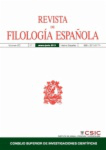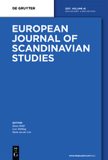
Ezhegodnik Finno-Ugorskikh Issledovanii-Yearbook of Finno-Ugric Studies
Scope & Guideline
Celebrating the Diversity of Finno-Ugric Scholarship
Introduction
Aims and Scopes
- Linguistic Studies:
Explores the intricacies of Finno-Ugric languages, including grammatical structures, vocabulary evolution, and dialectal variations. - Cultural Anthropology:
Investigates the cultural practices, traditions, and folklore of Finno-Ugric peoples, often through ethnographic fieldwork and analysis. - Historical Contextualization:
Analyzes historical developments affecting Finno-Ugric groups, including sociopolitical changes, migration patterns, and cultural exchanges. - Literary Analysis:
Examines literary works from Finno-Ugric authors, focusing on thematic elements, stylistic techniques, and the socio-political implications of their narratives. - Interdisciplinary Approaches:
Encourages collaboration across disciplines, integrating insights from linguistics, history, cultural studies, and sociology to enrich understanding of Finno-Ugric identities.
Trending and Emerging
- Digital Humanities:
An emerging interest in the application of digital technologies to study Finno-Ugric languages and cultures, including projects on digital corpora and online archives. - Cultural Identity and Diaspora Studies:
Growing research on the identities of Finno-Ugric peoples in diaspora, exploring how migration affects cultural retention and transformation. - Environmental and Ecological Perspectives:
Increasing focus on the relationship between Finno-Ugric cultures and their environments, examining traditional ecological knowledge and sustainable practices. - Interdisciplinary Studies on Education:
Rising interest in educational methodologies that incorporate Finno-Ugric languages and cultures, particularly in multilingual and multicultural educational settings. - Contemporary Literature and Media:
A trend towards analyzing modern literary works and media representations of Finno-Ugric peoples, reflecting current societal issues and cultural narratives.
Declining or Waning
- Traditional Folklore Studies:
While still present, the volume of research specifically focused on traditional folklore has decreased, perhaps overshadowed by a growing interest in contemporary cultural expressions. - Historical Linguistics:
The exploration of historical linguistics, particularly in relation to ancient language forms and their evolution, appears less frequently, indicating a potential shift towards applied linguistics and modern language usage. - Colonial and Post-Colonial Studies:
Themes related to colonial impacts on Finno-Ugric groups have waned, possibly reflecting a broader move towards examining current sociopolitical dynamics rather than historical colonial legacies.
Similar Journals

Palaeohispanica-Revista sobre Lenguas y Culturas de la Hispania Antigua
Unveiling the Rich Heritage of Iberian CulturesPalaeohispanica-Revista sobre Lenguas y Culturas de la Hispania Antigua is a distinguished academic journal dedicated to the study of ancient Spanish languages and cultures. Published by the INST FERNANDO CATOLICO in Spain, this journal serves as an essential platform for scholars and researchers exploring the rich historical and linguistic heritage of Iberia. With a specific focus on the intersections of archaeology, history, linguistics, and cultural studies, Palaeohispanica has garnered substantial recognition, reflecting its commitment to high-quality research as evidenced by its rankings in prominent Scopus categories, reaching the 80th percentile in History and the 69th in Archaeology. While the journal operates without an Open Access option, it continues to contribute significantly to the academic discourse surrounding ancient Hispania from 2019 to 2023, ensuring that vital research is accessible to a discerning audience. As a Q3 and Q2 ranked publication in various relevant categories, it is an invaluable resource for professionals, researchers, and students eager to delve into the complexities of ancient languages and cultures.

SCHWEIZERISCHES ARCHIV FUR VOLKSKUNDE
Advancing Understanding of Cultural TraditionsSCHWEIZERISCHES ARCHIV FUR VOLKSKUNDE, with ISSN 0036-794X, is a vital resource for scholars and practitioners in the fields of Arts and Humanities and Cultural Studies. Published by G KREBS VERLAGSBUCHHANDLUNG AG in Switzerland, this journal plays a crucial role in advancing the discourse surrounding folk culture, traditions, and anthropology. Despite its current ranking in the Q4 category for both Arts and Humanities and Cultural Studies, the journal serves as an essential platform for disseminating unique research findings and insights, contributing to a well-rounded understanding of diverse cultural practices. Researchers, professionals, and students are encouraged to explore the rich content produced between 2008 and 2014, and from 2017 to 2023, which reflects a commitment to fostering a multidisciplinary approach to folklore studies. By addressing the complexities of cultural dynamics, the journal not only promotes scholarly engagement but also enriches the academic community’s appreciation of folk traditions.

Tomsk State University Journal
Fostering Scholarly Excellence in Science and SocietyTomsk State University Journal is a prestigious academic publication dedicated to advancing knowledge across various fields of study, with a particular emphasis on natural and social sciences. Published by TOMSK STATE UNIV, this journal serves as a vital platform for researchers and scholars to disseminate innovative findings, contributing to the global academic community. Although specific metrics such as the impact factor are not currently listed, its rigorous peer-review process ensures the high quality and relevance of the research it publishes. The journal is committed to open discourse and is accessible to a diverse audience of professionals, students, and academics alike. With its base in Tomsk, Russia, the journal embodies a rich tradition of scholarly excellence, making it an invaluable resource for anyone looking to engage deeply with contemporary research trends.

REVISTA DE FILOLOGIA ESPANOLA
Exploring the Depths of Spanish Linguistics and LiteratureREVISTA DE FILOLOGIA ESPANOLA is a distinguished academic journal dedicated to the fields of linguistics and literature, published by the CONSEJO SUPERIOR INVESTIGACIONES CIENTIFICAS (CSIC) since 1954, and has been an Open Access journal since its inception. Situated in Madrid, Spain, this journal has emerged as a crucial platform for the dissemination of scholarly research, with notable rankings including Q2 in Linguistics and Language and Q1 in Literature and Literary Theory as of 2023. The journal's commitment to fostering academic dialogue is reflected in its impressive Scopus rankings, including a 79th percentile in the Arts and Humanities for Literature and Literary Theory. Covering a wide range of topics from linguistic theory to literary critique, REVISTA DE FILOLOGIA ESPANOLA is essential reading for researchers, professionals, and students alike, providing valuable insights and cutting-edge research in the ever-evolving landscape of Spanish philology.

Nauchnyi Dialog
Connecting Cultures, Bridging DisciplinesNauchnyi Dialog, published by TSENTR NAUCHNYKH & OBRAZOVATELNYKH PROEKTOV, is a pioneering open-access journal that has broadened its reach since its inception, embracing an open-access model in 2017. With its ISSN 2225-756X and E-ISSN 2227-1295, the journal aims to facilitate scholarly communication in the fields of Arts and Humanities, with a particular focus on Literature, History, Language, and Linguistics. Although it currently holds modest Scopus rankings within these disciplines, placing in the lower percentiles, the journal remains committed to fostering new dialogues and interdisciplinary work to advance understanding and scholarship. Featuring contributions from researchers and academics worldwide, Nauchnyi Dialog is dedicated to addressing contemporary issues and debates within these fields. This journal serves as a valuable resource for anyone interested in the exploration of cultural narratives and linguistic frameworks in a rapidly evolving academic landscape. Located in Ekaterinburg, Russia, the journal aims to connect global scholars interested in the intersection of literature, linguistics, and social sciences, promoting accessibility and innovation in research.

JOURNAL OF THE POLYNESIAN SOCIETY
Advancing Knowledge in Polynesian StudiesJOURNAL OF THE POLYNESIAN SOCIETY, published by Polynesian Soc Inc, is a distinguished periodical that aims to disseminate high-quality research in the fields of anthropology, archaeology, and cultural studies. With an ISSN of 0032-4000 and E-ISSN 2230-5955, this journal serves as a key resource for scholars and practitioners interested in the rich historical and cultural narratives of the Polynesian region. Since its inception, the journal has published a multitude of scholarly articles, reflecting a convergence of research from 1971 to 2022, thus establishing itself as a foundational text within its domain. The journal is indexed in notable categories with a Q4 ranking in anthropology and a Q3 in both archaeology and cultural studies as of 2023, highlighting its relevant contributions to the academic community. Moreover, its impressive Scopus ranks position it within the 80th percentile for archaeology and the 67th percentile for anthropology, showcasing its dedication to scholarly excellence. Although not an open-access publication, the journal remains a vital avenue for academic discourse and exchange, making it a significant resource for researchers, professionals, and students dedicated to understanding the diverse cultures of the Pacific Islands.

European Journal of Scandinavian Studies
Deepening understanding of the Scandinavian cultural landscape.European Journal of Scandinavian Studies is an esteemed journal published by Walter de Gruyter GmbH, dedicated to advancing scholarship in the fields of Cultural Studies, Linguistics and Language, and Literature and Literary Theory. Since its inception in 2010, the journal has been a pivotal platform for researchers and scholars, showcasing cutting-edge research and critical discussions pertaining to Scandinavian languages and cultures. With an ISSN of 2191-9399 and an E-ISSN of 2191-9402, the journal emphasizes accessibility to impactful academic work, despite its current non-open access model. While the journal is categorized within the Q4 quartile for Cultural Studies and Linguistics/Language, it has shown notable potential in ranking higher in its specialized domains, fostering a growing community of researchers invested in Scandinavian studies. The journal's office is located in Berlin, Germany, further enriching its European scholarly context. As it continues to evolve, the European Journal of Scandinavian Studies serves as a vital resource for academics seeking to engage deeply with the multifaceted aspects of Scandinavian culture and linguistics.

Novyi Filologicheskii Vestnik-New Philological Bulletin
Fostering Dialogue Across Linguistics and LiteratureNovyi Filologicheskii Vestnik-New Philological Bulletin is a distinguished academic journal published by the Russian State University for the Humanities, devoted to the interdisciplinary study of linguistics, literature, and philology. With its ISSN 2072-9316, this journal serves as an essential platform for scholars, researchers, and students aiming to explore the depths of philological research and its applications. Although currently operating under a traditional access model, the journal emphasizes accessibility and engagement with advancements in linguistic theory and literary analysis, reflecting the evolving landscape of philological studies. The bulletin is dedicated to fostering academic discourse by publishing original research, critical essays, and comprehensive reviews, thereby contributing significantly to the advancement of knowledge and understanding in the field. Set in the heart of Moscow, the journal aims to bridge local and global scholarship, inviting contributions that showcase innovative methodologies and theoretical frameworks. Overall, Novyi Filologicheskii Vestnik-New Philological Bulletin stands as a vital resource for anyone interested in contemporary developments in philology and related disciplines.

Lingua Italiana
Connecting Scholars and Enthusiasts of the Italian LanguageLingua Italiana is a distinguished journal published by FABRIZIO SERRA EDITORE, dedicated to the exploration and advancement of the Italian language in both its literary and linguistic contexts. With its ISSN 1724-9074 and E-ISSN 1826-8080, Lingua Italiana aims to foster scholarly dialogue among researchers, professionals, and students invested in Italian studies, linguistics, and cultural discourse. Located in Pisa, Italy, the journal provides a platform for rigorous peer-reviewed articles that reflect the latest research, theoretical frameworks, and critical analyses. Although it operates under a subscription model, the journal remains an invaluable resource due to its commitment to quality content and comprehensive coverage of contemporary issues affecting the Italian language. By contributing to Lingua Italiana, authors can not only enhance their academic footprint but also engage with a global audience interested in rich linguistic heritage and its evolution.

Nueva Revista Filologia Hispanica
Unlocking the Richness of Hispanic Culture and LanguageNueva Revista Filologia Hispánica, published by COLEGIO MEXICO, A C, DEPT PUBLICACIONES, has been a pivotal resource in the field of Hispanic philology since its establishment in 1966, transitioning to an open-access model that enhances the accessibility of scholarly works in the area. With an ISSN of 0185-0121 and an E-ISSN of 2448-6558, the journal is housed in Mexico City and aims to publish innovative research that contributes to the understanding of the linguistic and cultural dynamics of the Spanish language. It consistently ranks in the Q3 category of Linguistics and Language for 2023, reflecting its commitment to academic excellence as demonstrated by its Scopus ranking in both Arts and Humanities and Social Sciences. With converged years from 2011 to 2024, the journal encourages contributions that inspire further discourse among researchers, professionals, and students, thus solidifying its importance as a scholarly platform in the linguistics landscape.